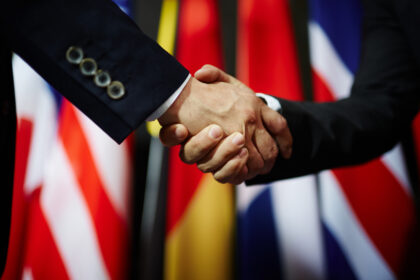European Leaders Discuss Migration and Ukraine at UK Summit Amid Growing Concern Over US Direction
European leaders gathered for a pivotal summit at Blenheim Palace in the UK to discuss pressing issues such as migration, energy security, and the ongoing war in Ukraine. The meeting, held against the backdrop of rising uncertainty about the future of the U.S. as a reliable ally, especially if Donald Trump wins a second term, brought together heads of state from across Europe.
Newly elected U.K. Prime Minister Keir Starmer hosted the summit, aiming to rebuild relationships between the U.K. and its European neighbors, four years after the Brexit fallout. A key focus of the summit was the collective stance of European nations on Ukraine, particularly in the face of continued Russian aggression.
Support for Ukraine and Concerns Over US Reliability
The summit, part of the European Political Community (EPC), saw leaders emphasize their continued support for Ukraine. Ukrainian President Volodymyr Zelenskyy was a special guest, and his presence underscored the urgency of maintaining unified support for his country as it defends itself against Russian military actions.
Prime Minister Starmer set the tone early on, stating, “Our first task here today is to confirm our steadfast support for Ukraine, to unite once again behind those values that we cherish and to say we will face down aggression on this continent together.” Starmer highlighted how Russia’s threat extends far beyond Ukraine and affects the whole of Europe.
With the U.S. presidential election looming, there is growing concern among European leaders about the reliability of U.S. support under a potential second Trump administration. Trump’s “America First” approach during his first term has left European nations uneasy about the future of NATO and collective security.
Starmer’s Push to Mend Post-Brexit Relations
This summit was significant for the U.K., as Starmer’s newly formed Labour government seeks to repair strained relationships with the European Union (EU) following Brexit. Holding the summit at Blenheim Palace, the birthplace of former British Prime Minister Winston Churchill, was symbolic of Britain’s desire to rekindle its leadership role in European politics.
Among the notable attendees were German Chancellor Olaf Scholz, French President Emmanuel Macron, Italian Prime Minister Giorgia Meloni, Polish Prime Minister Donald Tusk, and NATO Secretary-General Jens Stoltenberg. The presence of these key European leaders further highlighted the significance of the discussions surrounding Ukraine, migration, and energy security.
Migration and Energy Security: Key Topics of Discussion
In addition to Ukraine, migration and energy security took center stage at the summit. Europe has been grappling with the challenges of migration, particularly in light of the war in Ukraine and other global crises that have displaced millions of people. The leaders discussed ways to handle the influx of migrants while maintaining security and humanitarian obligations.
Energy security is also a critical issue, with Europe looking for ways to reduce its dependency on Russian energy supplies, especially natural gas. The war in Ukraine has significantly disrupted energy markets, leading to higher costs and economic instability. The summit aimed to find collaborative solutions to these pressing problems.
Zelenskyy to Address UK Cabinet
In a rare move, Ukrainian President Zelenskyy is set to address Starmer’s Cabinet the day after the summit. This is an unusual privilege for a foreign leader and signals the U.K.’s commitment to Ukraine’s cause under Starmer’s Labour government. By extending such an honor to Zelenskyy, Starmer demonstrates that his government intends to maintain the strong support for Kyiv that was established by his Conservative predecessors.
Conclusion
The European Political Community summit at Blenheim Palace was a critical meeting for European leaders, focused on supporting Ukraine, addressing migration challenges, and ensuring energy security for the continent. At the same time, growing concerns about U.S. foreign policy and its future role in NATO weighed heavily on the discussions. As European nations look to the future, they remain united in their determination to support Ukraine and face the common threats to security and democracy.






